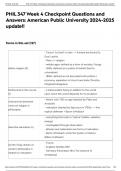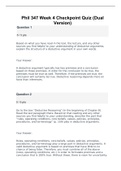Phil 347 week 4 checkp - Study guides, Class notes & Summaries
Looking for the best study guides, study notes and summaries about Phil 347 week 4 checkp? On this page you'll find 49 study documents about Phil 347 week 4 checkp.
All 49 results
Sort by
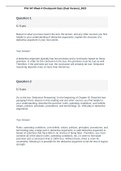
-
Phil 347 Week 4 Checkpoint Quiz (Dual Version)_2023
- Exam (elaborations) • 10 pages • 2023
-
- $8.72
- 1x sold
- + learn more
Question 1 5 / 5 pts Based on what you have read in the text, the lecture, and any other sources you find helpful to your understanding of deductive arguments, explain the structure of a deductive argument in your own words. Your Answer: A deductive argument typically has two premises and a conclusion based on those premises. In order for the conclusion to be true, the premises must be true as well. Therefore, if the premises are true, the conclusion will certainly be true. Deductive re...
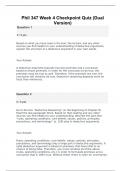
-
Phil 347 Week 4 Checkpoint Quiz (Dual Version)
- Exam (elaborations) • 12 pages • 2024
-
- $9.98
- + learn more
Phil 347 Week 4 Checkpoint Quiz (Dual Version) Based on what you have read in the text, the lecture, and any other sources you find helpful to your understanding of deductive arguments, explain the structure of a deductive argument in your own words. Your Answer: A deductive argument typically has two premises and a conclusion based on those premises. In order for the conclusion to be true, the premises must be true as well. Therefore, if the premises are true, the conclusion will ...
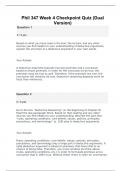
-
Phil 347 Week 4 Checkpoint Quiz (Dual Version)
- Exam (elaborations) • 12 pages • 2024
-
- $11.79
- + learn more
Phil 347 Week 4 Checkpoint Quiz (Dual Version) Based on what you have read in the text, the lecture, and any other sources you find helpful to your understanding of deductive arguments, explain the structure of a deductive argument in your own words. Your Answer: A deductive argument typically has two premises and a conclusion based on those premises. In order for the conclusion to be true, the premises must be true as well. Therefore, if the premises are true, the conclusion will ...
PHIL 347 Week 4 Checkpoint Questions and Answers: American Public University update!!
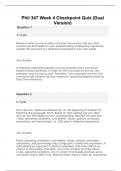
-
Phil 347 Week 4 Checkpoint Quiz (Dual Version)
- Exam (elaborations) • 12 pages • 2024
-
- $12.49
- + learn more
Phil 347 Week 4 Checkpoint Quiz (Dual Version) Based on what you have read in the text, the lecture, and any other sources you find helpful to your understanding of deductive arguments, explain the structure of a deductive argument in your own words. Your Answer: A deductive argument typically has two premises and a conclusion based on those premises. In order for the conclusion to be true, the premises must be true as well. Therefore, if the premises are true, the conclusion will ...
Phil 347 Week 4 Checkpoint Quiz (Dual Version)
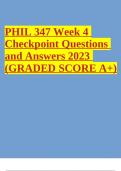
-
PHIL 347 Week 4 Checkpoint Questions and Answers 2023 (GRADED SCORE A+)
- Exam (elaborations) • 11 pages • 2023
-
- $10.99
- + learn more
PHIL 347 Week 4 Checkpoint Questions and Answers 2023 (GRADED SCORE A+) Question 1 5 / 5 pts Based on what you have read in the text, the lecture, and any other sources you find helpful to your understanding of deductive arguments, explain the structure of a deductive argument in your own words. Your Answer: A deductive argument typically has two premises and a conclusion based on those premises. In order for the conclusion to be true, the premises must be true as well. Therefore, if...
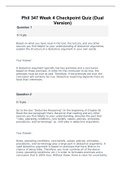
-
Phil 347 Week 4 Checkpoint Quiz (Dual Version)
- Exam (elaborations) • 12 pages • 2023
-
- $17.48
- + learn more
Phil 347 Week 4 Checkpoint Quiz (Dual Version) Based on what you have read in the text, the lecture, and any other sources you find helpful to your understanding of deductive arguments, explain the structure of a deductive argument in your own words. Your Answer: A deductive argument typically has two premises and a conclusion based on those premises. In order for the conclusion to be true, the premises must be true as well. Therefore, if the premises are true, the conclusion will ...
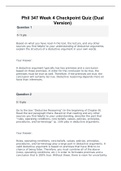
-
Phil 347 Week 4 Checkpoint Quiz (Dual Version)
- Exam (elaborations) • 12 pages • 2022
-
- $15.49
- 3x sold
- + learn more
Phil 347 Week 4 Checkpoint Quiz (Dual Version) Based on what you have read in the text, the lecture, and any other sources you find helpful to your understanding of deductive arguments, explain the structure of a deductive argument in your own words. Your Answer: A deductive argument typically has two premises and a conclusion based on those premises. In order for the conclusion to be true, the premises must be true as well. Therefore, if the premises are true, the conclusion will ...
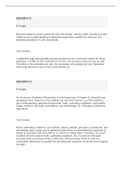
-
PHIL 347 Week 4 Checkpoint Questions and Answers: American Public University
- Exam (elaborations) • 10 pages • 2021
-
- $10.30
- 4x sold
- + learn more
Question 1 5 / 5 pts Based on what you have read in the text, the lecture, and any other sources you find helpful to your understanding of deductive arguments, explain the structure of a deductive argument in your own words. Your Answer: A deductive argument typically has two premises and a conclusion based on those premises. In order for the conclusion to be true, the premises must be true as well. Therefore, if the premises are true, the conclusion will certainly be true. Deductive reason...

How much did you already spend on Stuvia? Imagine there are plenty more of you out there paying for study notes, but this time YOU are the seller. Ka-ching! Discover all about earning on Stuvia

